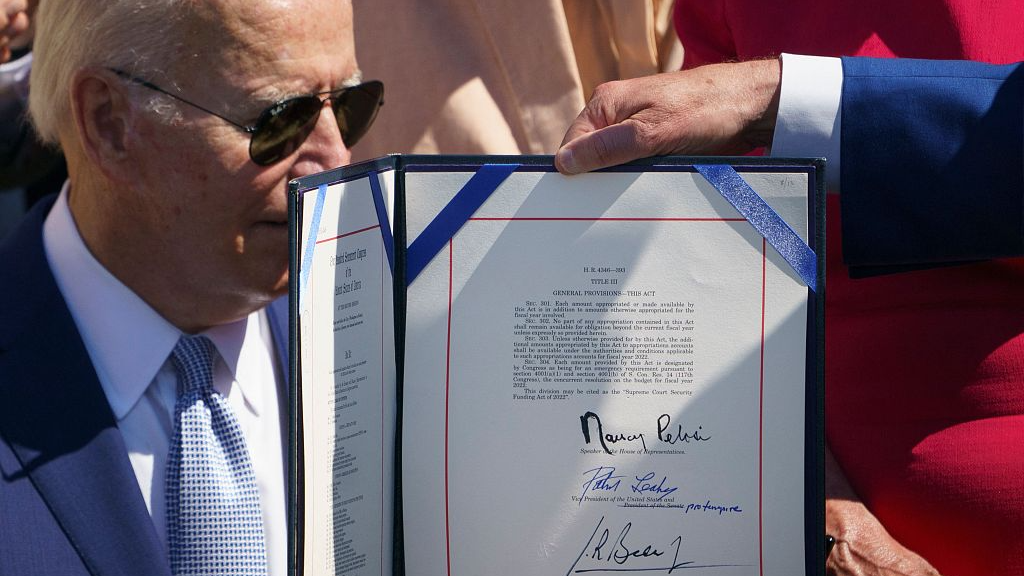
Workers at a chip packaging production line in Nantong of east China's Jiangsu Province, August 10, 2022. /CFP
Workers at a chip packaging production line in Nantong of east China's Jiangsu Province, August 10, 2022. /CFP
Editor's note: Emilia Fernandez, a security and political analyst with a focus on South Asian geopolitics, is a Ph.D. researcher at the University of Lucerne, Switzerland. The article reflects the author's views and not necessarily those of CGTN.
A new dimension has surfaced in the ongoing geopolitical tensions triggered by the provocative Asia trip by U.S. House of Representatives Speaker Nancy Pelosi after South Korea decided to attend the preliminary meeting of the "Chip 4" alliance. With hints of losing the Chinese market, experts say joining this anti-China platform could be "commercial suicide" for South Korea as China is not only the largest consumer of its semiconductors but also its largest trading partner.
Apart from bringing economic loss, this U.S.-led initiative will create misunderstanding and mistrust between Beijing and Seoul. Cautioning the countermeasures that China will take if Seoul joins this alliance, policy wonks raise the question, "Should South Korea join the Chip 4 alliance?" It is a time-sensitive decision to answer this question considering national interests, regional security and geopolitical reality.
The "Chip 4" or the "Fab 4" is a platform spearheaded by the U.S. to isolate China from the global semiconductor value chain. In March, Washington proposed to Japan, South Korea and China’s Taiwan region to kick start this chip alliance, an apparent move to curb China's position in the global chip market. Though South Korea has joined a number of U.S.-backed initiatives in this region, such as the so-called Indo-Pacific Economic Framework (IPEF), the country is still in a strategic dilemma whether to join this alliance as concern remains over its deep-rooted historical connections and economic dependence on China. Considering this complex economic scenario, experts point out at least eight reasons explaining why the Blue House should not join this U.S.-initiated alliance.
First, South Korea exported $128 billion worth of semiconductors last year, of which China consumed almost 60 percent. This figure signifies the value of the Chinese market for South Korea. If South Korea joins the alliance, China may accelerate its efforts to flourish its domestic semiconductor industry to become self-reliant. Apart from replacing South Korean semiconductors with locally produced alternatives, this move will help China in grabbing the market share of South Korea and other countries with affordable chips. As a result, South Korea's semiconductor exports will suffer a huge blow if it blindly joins this exclusive grouping against China.
Second, in 2018, two-way trade between China and South Korea surpassed $300 billion which is around 60 times the trade 30 years ago when these two countries established diplomatic ties. China is not only the largest trading partner and export destination of South Korea, but also the largest source of imports and overseas students. These data portray how deeply South Korea's economy is intertwined with China. Apparently, Seoul's possible joining of "Chip 4" would harm overall trade ties with Beijing, which must be considered cautiously.

The Chips and Science Act of 2022 signed by U.S. President Joe Biden on the South Lawn of the White House in Washington, the U.S., August 9, 2022. /CFP
The Chips and Science Act of 2022 signed by U.S. President Joe Biden on the South Lawn of the White House in Washington, the U.S., August 9, 2022. /CFP
Third, recently South Korea registered a "trade deficit" with China for the second time after 1994. After joining "Chip 4," the U.S. may force South Korea to limit semiconductor exports to China to materialize the motives of this alliance to uphold the idea of "America First,'' which in turn will lead to a higher trade deficit.
Fourth, although "Fab 4" is concentrated on semiconductors, it will have an impact on other industries as well because of the "spillover effect." Any friction in chip business may adversely affect the export of other products from South Korea to China.
Fifth, South Korea has been striking a fine balance between China and the U.S. as it sits in the crosshairs of growing China-U.S. competition. Seoul's delicate balancing strategy with its largest trading partner, China, and its key military ally, the U.S., has been put to the test over the question of joining the U.S.-backed chip alliance.
Sixth, the U.S. has been striving to contain China's growing presence in this region through a number of initiatives such as the Quadrilateral Security Dialogue (Quad), the IPEF and others. And the "Chip 4" is also a part of its long-standing plan. This small political group intends to divide the global semiconductor industry, instigating a "new trade war" of which the Asian countries will be the direct victims, followed subsequently by the rest of the world.
Seventh, this chip alliance is different from that of other U.S.-led initiatives in this region as it involves participation of China's Taiwan region, a sensitive concern for China. Recognizing Taiwan as a "separate country" in this alliance is a direct violation of the one-China principle.
Finally, international trade happens based on "trust" which will be seriously questioned, on the part of South Korea, if it suddenly joins this grouping against China targeted at countering China's influence in the global supply chain.
Seoul has been stuck between a rock and a hard place after getting a proposal from Washington to join the "Chip 4" alliance, the most challenging diplomatic choice it has faced in recent times. The South Korean government should keep in mind that the global economy is deeply interconnected and inseparably integrated in this multipolar world.
As any injudicious move (regarding the chip alliance) will breach the bilateral trust with Beijing and endanger South Korea's economic interest, Seoul should do the needed homework with careful calculations before joining this alliance, a plot to serve the U.S. geopolitical and geo-economic interests by countering China.
(If you want to contribute and have specific expertise, please contact us at opinions@cgtn.com. Follow @thouse_opinions on Twitter to discover the latest commentaries in the CGTN Opinion Section.)

